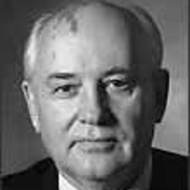March 27, 2007
A Message from GSI President Jonathan Granoff
Dear friends,
Hon. Douglas Roche O.C., Chairman of the Middle Powers Initiative, delivered an impassioned speech, “Turning Pessimism into Optimism: A Growing Consensus on Nuclear Disarmament,” at a high-level conference of the Ministry of Foreign Affairs of Germany in Berlin this month. In that presentation, Senator Roche said that there are now grounds for optimism.
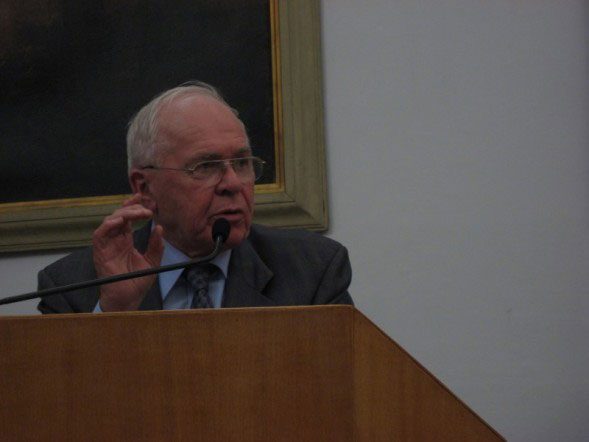 |
A few states have thwarted progress on nuclear non-proliferation and disarmament by failing to honor their legally required duties to downgrade the salience of nuclear weapons in their security policies and promote cooperative efforts to reinforce non-proliferation. Nevertheless, the majority of the world is forging a new consensus which can make us all safer.
There are numerous threat-reducing, security-enhancing proposals that can strengthen the multilateral legal regime to prevent the spread of nuclear weapons and to advance nuclear disarmament. These proposals represent modest, incremental steps that enjoy a nearly universal consensus. These steps include, but are in no means limited to:
- the entry-into-force of the Comprehensive nuclear Test-Ban Treaty;
- the negotiation of a verifiable Fissile Material Cut-Off Treaty;
- deeper, irreversible cuts in the arsenals of the US and Russia;
- taking deployed weapons off of hair-trigger alert; and
- the conclusion of multilaterally negotiated, legally-binding security assurances for non-nuclear weapon States parties to the nuclear Non-Proliferation Treaty.
The broad base of support for these proposals is demonstrated by the recent op/ed, “A World Free of Nuclear Weapons,” published on January 4 in the Wall Street Journal. Authors George Schultz, William Perry, Henry Kissinger and Sam Nunn advance many of the same proposals that the Middle Powers Initiative and the Bipartisan Security Group—both programs of GSI—have been advocating in Congress and in the international diplomatic community. The WSJ article quoted President Ronald Reagan, who characterized nuclear weapons as “totally irrational, totally inhumane, good for nothing but killing, possibly destructive of life on Earth and civilization.”
Appropriately, President Mikhail Gorbachev responded in the WSJ on January 31st:
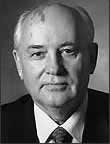 |
“We must put the goal of eliminating nuclear weapons back on the agenda, not in a distant future but as soon as possible. It links the moral imperative – the rejection of such weapons from an ethical standpoint—with the imperative of assuring security. It is becoming clearer that nuclear weapons are no longer a means of achieving security; in fact, with every passing year, they make our security more precarious.”
At GSI, we are doing our utmost to respond to this convergence of moral and practical imperatives by working through our four focused programs. It is worthwhile to highlight the upcoming meeting of the Middle Power Initiative’s Article VI Forum, which will be held in Vienna, March 29-30 (click here to download the Briefing Paper), the outstanding network of the Parliamentary Network for Nuclear Disarmament, the Bipartisan Security Group leadership addressing the Democratic Study Group on National Security in the US Congress, and the conference of the Project for Nuclear Awareness, “Beyond Nuclear Weapons”, which will be held at the National Press Club on March 28th.
I’d also like to highlight our efforts to advance a cooperative regime in outer space. Recently, the US administration has reaffirmed its efforts to weaponize outer space, an endeavor which will have a dramatically negative effect on progress on arms control on Earth. For this reason, GSI is committed to work on advancing a cooperative regime, based on the rule of law, in the coming months.
We are honored to work in an international community of people around the world who truly care to hand over a better world to the next generation. We hope you can join us in these efforts.
Sincerely,
GSI Activities
February 9, 2007 – New York, NY – Consultation on Security in Outer Space
On February 9, GSI hosted a consultation in its New York office, entitled “Advancing Cooperative Security in Space.” Over 25 nations participated in this first of a series of such consultations, which facilitate discussion amongst interested governments and experts on advancing a cooperative regime in outer space and preventing a celestial arms race.
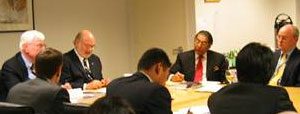 |
This consultation featured presentations by Ambassador Robert Grey, Jr., Director of the Bipartisan Security Group and former US ambassador to the Conference on Disarmament in Geneva, and Dr. Jürgen Scheffran, a Senior Research Scientist in the Program in Arms Control, Disarmament and International Security of the University of Illinois at Urbana-Champaign and co-founder of the International Network of Engineers and Scientists Against Proliferation, and was moderated by GSI President Jonathan Granoff. Under-Secretary-General for Disarmament Affairs, Mr. Nobuaki Tanaka, provided the opening remarks.
GSI affirms the need for a cooperative security regime based on the rule of law to prevent turning space into another battlefield. The world depends on the use of satellites for intelligence and communications. The cooperation that we take for granted with our cellular phones every day serves as an example of the benefits of space-related technologies. This cooperation is essential to our pursuit of common security and is a precondition for cooperation in addressing other universal threats such as those posed by our climate or by social instability arising from gross disparities of wealth. Moreover, former Undersecretary of State John Holum of the Bipartisan Security Group has correctly asserted that if unilateralism prevails over cooperation in the heavens, the non-proliferation regime could very well be its first victim. A legal regime promoting multilateral cooperation in space is absolutely imperative to our security here on earth.
>> Click here for the full report
November 13-15, 2006— New York, NY— Global Creative Leadership Summit
On November 14, Mr. Granoff was a featured speaker on a panel entitled “Coping with Global Fears and Threats” at the Global Creative Leadership Summit, which brought together leading thinkers and activists to discuss issues of global importance.
Mr. Granoff spoke on the rule of law, cooperative peace, and collaborative security concerns surrounding nuclear weapons and non-proliferation. The event was well attended and brought together current and former diplomats, spiritual and civil society leaders. He was joined on a panel of experts by Colin Blakemore, Chief Executive Officer, Medical Research Council, David Boies, Chairman, Boies, Schiller & Flexner LLP, Bernard Lietaer, Consultant and Co-architect of the Euro, and Jody Westby, Chief Executive Officer, Global Cyber Risk LLC. More information on the conference can be found at: https://www.creativeleadershipsummit.org/
MPI Activities
March 5-6, 2007 – Berlin, Germany – Global Issues Forum
At the 16th Global Issues Forum on March 5-6, the German Foreign Office and the German Foundation for Peace Research organized a conference entitled “New Ways in Arms Control and Disarmament.”
At this prestigious conference, MPI Chairman, Hon. Douglas Roche, O.C., delivered a presentation entitled “Turning Pessimism into Optimism: A growing consensus on nuclear disarmament.” In his remarks, Senator Roche offered a sense of hope:
“In historical terms, the tide is turning against nuclear weapons. The moral, legal and military case against them is now better understood than ever before. The intellectual argument—that nuclear weapons are needed for security—is now rejected as baseless. Only a small coterie of defenders of nuclear weapons can be found today. We know that this coterie still possess immense political power. But the opponents of nuclear weapons are gathering strength. That itself is a new reason for hope. In the present crisis lie the seeds of opportunity.”
The workshops addressed the following topics:
- Is the regime on non-proliferation set to fail? The control of nuclear weaponry at the crossroads.
- Dealing with new and upcoming nuclear powers: the call for regional arms control with regard to Asia and the Middle East.
- The threat of an arms race in space: space weapons as a challenge for pre-emptive arms control.
- Restrictions on and control of conventional arms: topics, concepts, initiatives.
- Policy options to re-animate arms control and disarmament.
>>Read remarks by Douglas Roche, O.C.
>>More information about the conference
BSG Activities
February 21, 2007 – New York, NY – American Bar Association Panel on Nuclear Weapons
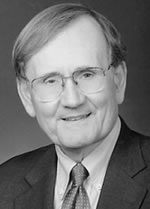 |
BSG Chairman
|
On February 20, BSG Chairman Ambassador Thomas Graham and GSI President Jonathan Granoff were featured speakers at the New York City Bar Association’s Council on Foreign Affairs.
They again joined each other as featured panelists on February 21, at a breakfast panel sponsored by the American Bar Association’s (ABA) Blue Ribbon Task Force on Nuclear Non-Proliferation/National Security Committee entitled “Threats Posed by Nuclear Weapons: Crisis and Opportunity.”
Both panels were chaired by Michael H. Byowitz, former Chair of the ABA Section of International Law and a partner at the law firm Wachtell, Lipton, Rosen and Katz, which hosted the event.
The panelists addressed the current status and prospects for the international treaty system regarding political, diplomatic and legal developments related to the nuclear Non-Proliferation Treaty, North Korea, Israel, Iran and the current political landscape in Washington. The panelists made extensive references to the testimony that they had given before the US Congress in the fall of 2006.
PNND Activities
PNND Program in the Middle East
Following visits to Egypt and Israel by PNND Global Coordinator Alyn Ware and the appointment of PNND personnel in both countries, PNND is starting a program in the Middle East. We welcome Itay Eisenger as PNND Outreach Coordinator in Israel, Nermin Ali Abd el-Ghany el-Galy as PNND Outreach Coordinator in Egypt, and Tal Rogoff as PNND Assistant Coordinator for Israel (based at head office in New Zealand).
 |
PNND, in collaboration with its partner organizations the Middle Powers Initiative and the Palestine-Israel Journal, plans to bring parliamentarians, academics and policy makers from the key countries in the region together in informal nonpartisan settings to explore proposals for reducing tension about nuclear activities, building confidence between the countries, preventing further proliferation and working towards a nuclear-weapon-free zone. We will report on progress in subsequent PNND Updates.
>> More information on Middle East Proliferation concerns is available on the PNND website
February 14-15, 2007 – Mexico City, Mexico – Treaty of Tlatelolco 40th Anniversary
Alyn Ware, Global Coordinator, represented PNND at the 40th Anniversary of the establishment of the Latin American and Caribbean Nuclear-Weapon-Free Zone (under the Treaty of Tlatelolco). This historic treaty was commemorated on February 14-15 in Mexico City by a high-level ceremony and an academic seminar hosted by the Mexican Ministry of Foreign Relations.
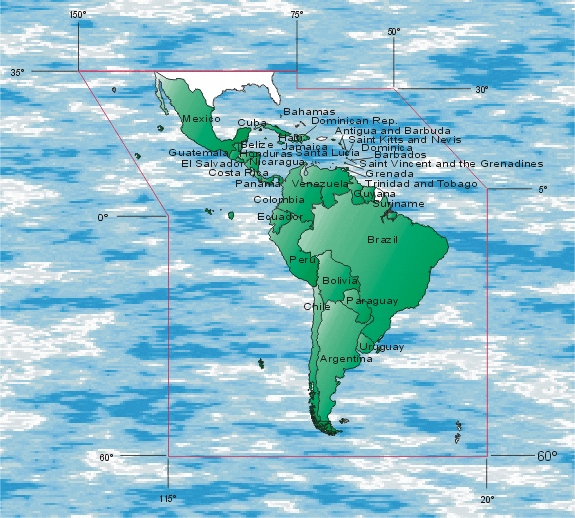 |
|
Map of Treaty of Tlatelolco countries |
The event included a range of interesting speakers (see official program), delegates and participants from Latin America, the Caribbean and other countries. It included representatives of international organizations (including the United Nations, IAEA and Organization of American States), ambassadors and other government officials, justices (including a sitting judge from the International Court of Justice), members of parliament, academics, non-governmental organizations, students and media. There were also messages from a number of governments that could not participate and from the Mayors for Peace.
As an informal commemoration and seminar, there were no resolutions adopted. However, a summary of the event prepared by the International Association of Lawyers Against Nuclear Arms and the Atomic Mirror, and circulated at the closing session, highlights the key themes discussed and the aspirations of participants. These included:
- an affirmation of the significance of NWFZs;
- a call on the NWS to recognize and adhere to the aspirations of the zones to be free from the threat of nuclear weapons;
- recognition of the potential for establishing new NWFZs in regions like North East Asia, Europe, the Middle East and the Nordic/Arctic regions;
- encouragement for States to adopt national legislation (like New Zealand’s) which goes beyond the NWFZ provisions to comprehensively prohibit nuclear weapons including their transit and to criminalize nuclear weapons activities;
- a call for negotiations on a Nuclear Weapons Convention and highlighting the Model NWC which indicates the feasibility of such a treaty;
- additional efforts to encourage rapid progress on nuclear disarmament including the possibility of an International Court of Justice Advisory Opinion on non-compliance with nuclear disarmament obligations, and
- supporting enhanced collaboration between the NWFZs including the possibility of them working as a new powerful voting block at the United Nations.
There are a number of other conferences being organized over the next two years on NWFZs, including in Switzerland, Mongolia, Japan/Korea and the Middle East. Together these indicate a growing awareness of the significance of NWFZs in strengthening the moral, legal and political norm against nuclear weapons and in making practical progress towards a nuclear weapons free world. This also indicates a growing confidence in the potential to overcome complex regional issues and successfully negotiate additional NWFZs.
PNND Update #16 Now Available
On the PNND section of our website, you can find an update from the Parliamentary Network for Nuclear Disarmament, available in English, Spanish, German and French.
In this comprehensive update, PNND discusses parliamentary actions undertaken around the world, including:
- an Early Day Motion in the UK House of Commons, noting, inter alia, the Doomsday Clock change;
- Resolution 16/3296 in the German Bündestag, which calls on the government to support “new arms control initiatives…to effectively prevent the proliferation of weapons of mass destruction.” The resolution also notes that “new impulses on the part of NATO to reduce sub-strategic weapons in Europe would be sensible…(and) an important impulse to the strengthening of the international non-proliferation regime”;
- Resolution 3- 1683/1 in the Belgian Senate, which calls on the Belgian government to initiate action in NATO to review strategic doctrines concerning nuclear weapons and to facilitate the gradual withdrawal of the American tactical nuclear weapons from Europe;
- Early Day Motion 798 in the UK House of Commons, in which PNND member David Chaytor welcomed the statement by Henry Kissinger, Sam Nunn, William Perry and George Schultz on the urgency of the need for a new global initiative to build a framework for a world free of the nuclear threat;
PNND Update #16 also includes updated information on North Korea, the US Congress, analysis of the Chinese anti-satellite weapon test and more.
>>PNND Update #16 is available here
>>See the PNND website for resources in other languages
Disarmament and Peace Education Activities
March 4, 2007 – Swarthmore, PA – Guest Lecture at Sunday Services
Mr. Granoff delivered a powerful sermon, “The Moral Imperatives of Security,” to the Swarthmore United Methodist Church on Sunday, March 4.
The presentation centered around the principle of equity embodied in the Golden Rule: states must do unto other states what they wish to have done unto themselves. A handful of states implicitly claim exceptionalism when they assert that they alone have the right to possess and threaten the use of nuclear weapons while asserting that the pursuit of these weapons by others is immoral; this claim violates the principle of equity underlying the Golden Rule. This moral incoherence leads to instability in international affairs. Instability in the area of nuclear weapons policies presents an unacceptable risk. The solution is the moral coherence of the universal abolition of these horrific devices.
>>Read “Interfaith Imperatives Post-9/11: The Sovereign Value of the Golden Rule,” a published article on the topic of the Golden Rule and its applicability to international security
January 28, 2007 – New York, NY – “Another World Is Possible”
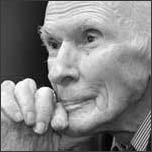 |
The New York Tri-State chapter of Citizens for Global Solutions hosted a dinner discussion on January 28th, wherein Jonathan Granoff spoke on topics of critical importance for our time: nuclear non-proliferation and disarmament issues and the weaponization of outer space. It was a great honor for Mr. Granoff to address this group, for like the Global Security Institute, Citizens for Global Solutions (CGS) has its origins in the vision and passion of Senator Alan Cranston. Along with Albert Einstein, Kurt Vonnegut, Mortimer Adler, EB White and other such visionaries, Senator Cranston helped found the World Federalist Association, the institutional genesis of CGS.
>>Read more about Citizens for Global Solutions
>>Click here for a video interview with Senator Cranston, recorded on April 17, 2000
December 4, 2006 – Haverford, PA – Panel on Space Security at Haverford College
Mr. Granoff joined Dr. Laura Grego of the Union of Concerned Scientists and addressed students, faculty, and members of the campus community at Haverford College on the new United States Space Policy.
 |
Dr. Grego spoke of the technical applications and utility of space weapons, citing factors that render the use of such weapons too expensive, logistically difficult, or of limited use to counter current or future threats to US interests. Such debated uses include: attacking targets on the ground from space; space-based interceptors for missile defense; anti-satellite weapons and; satellite-defensive weaponry.
Mr. Granoff spoke at length regarding the new space policy as published by the current administration in October 2006. The new space policy seeks to replace a doctrine of open use with a doctrine of ‘full-spectrum dominance’ and the containment agenda the use of that paradigm implied. He discussed the negative implications for global security if one nation or group of nations is allowed to arm space independent of a global, multilateral decision on the use of space.
>> Read Mr. Granoff’s recent op/ed in the Huffington Post, “Time for US Values in the Heavens”
Upcoming Activities
March 29-30, 2007 – Vienna, Austria – Article VI Forum
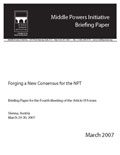 |
The Middle Powers Initiative will be convening the fourth meeting of the Article VI Forum in Vienna, March 29-30. This consultation, “Forging a New Consensus for the NPT,” will be held exactly one month prior to the first Preparatory Committee meeting of States parties to the NPT, also held in Vienna.
The briefing paper for this consultation is available on our website. We are proud of the briefing paper and deeply grateful to our colleague, Dr. John Burroughs of the Lawyers’ Committee on Nuclear Policy for his outstanding work in authoring it.
>> Click here for the Briefing Paper
>> Click here for the program for the consultation
May 9, 2007 – Vienna, Austria – Events to Advance a Cooperative Security Regime in Outer Space
GSI, working with its partners in government and non-governmental organizations, will be organizing events to be held during the nuclear Non-Proliferation Treaty (NPT) Preparatory Committee conference in Vienna during the week of May 7th.
One event, entitled “Weapons in Space and the Non-proliferation/Disarmament Regime”, will be held on May 9 in Plenary Room A of the Austria Center Vienna. It is co-sponsored by the Government of Sweden and the Secure World Foundation.
The panel will feature: Dr. Hans Blix, Chairman of the Weapons of Mass Destruction Commission; Ambassador Robert Grey, Director of the Bipartisan Security Group and will feature opening remarks from Ambassador Henrik Salander, Director of the WMDC. Other members of the WMDC are invited to speak.
March 28, 2007 – Washington, DC – Project for Nuclear Awareness
The Project for Nuclear Awareness (PNA) is an alliance of five expert and citizen groups. GSI is proud to be a founding member of PNA along with Business Leaders for Sensible Priorities, Lawyers Alliance for World Security, Nuclear Policy Research Institute, and Physicians for Social Responsibility.
The PNA is convening a substantive conference at the National Press Club on March 28th titled “Beyond Nuclear Weapons.” Anyone seriously interested in critical contemporary issues will appreciate this compelling event.
 |
BSG Director Grey and Chairman
|
>> Visit the PNA Website to Register for the Event
Presenters include Ambassadors Robert Grey and Thomas Graham of the Bipartisan Security Group, who will join PNA Chairman Dr. Craig Eisendrath, former US diplomat and GSI Development Consultant, to ensure our robust support of this event. Dr. Hans Blix, Helen Caldicott, Stephen Young and Laura Grego of the Union of Concerned Scientists, Rev. Bob Edgar of the National Council of Churches, and John Isaacs of the Council for a Livable World will also be participating.
GSI in the News
On January 21st, Al Jazeera television interviewed Jonathan Granoff on the India nuclear program and its negotiations with the US and Russia. He discussed the role of the NPT and non-proliferation regime on such technology transfers and the implications of this deal in the wider context of our globalized world.
Jonathan Granoff also wrote a recent op/ed, ”Time for US Values in the Heavens.”. Distributed by Minuteman Media, the op/ed was published in the Huffingtonpost.org and CommonDreams.
>> A printable PDF of the article can be found here
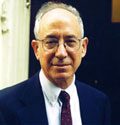 |
On Monday, March 12, GSI Consultant Dr. Craig Eisendrath appeared on “Radio Times” with Marty Moss-Cohane, syndicated nationally from Philadelphia’s National Public Radio station WHYY. Dr. Eisendrath discussed the threats posed by the weaponization of outer space, as articulated in his book, War in Heaven: The Arms Race in Outer Space.
>> Listen to Dr. Eisendrath on NPR
MPI Program Director Jim Wurst published an article in the March 2007 edition of Arms Control Today, “UN Battles Over Disarmament Bureaucracy”.
>> Click here for Mr. Wurst’s ACT article
Other News
NGO Working Group on UN Security Council
In February, 2007, the Global Security Institute became a member of the prestigious NGO Working Group on the Security Council. Coordinated by the Global Policy Forum, the NGO Working Group convenes off-the-record briefings almost every week with one of the ambassadors on the UN Security Council. The group has a special tradition of meeting with ambassadors in the Council presidency, but it also meets with ambassadors two or three other times during the year. The group also meets from time to time with top UN officials.
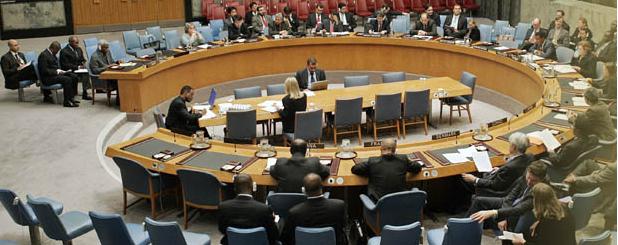 |
United Nations Security Council |
Group members include many large international NGOs in the fields of humanitarian relief, human rights, disarmament, global governance and development. The NGO side has high-level representation, including heads of agency, senior officers or respected representatives from authoritative NGOs such as Human Rights Watch, the International Peace Academy, the World Federalist Movement, Doctors without Borders, Lawyers Committee on Nuclear Policy, the Coalition for the International Criminal Court and more. The meetings take place predominantly with the Permanent Representative, either in missions or in NGO conference rooms.
>>Read more about the NGO Working Group
>>Read more about the UN Security Council, including current membership, agenda and adopted resolutions
>>Excellent summaries of the work of the Security Council can be found at securitycouncilreport.org
World Academy of Art and Science
GSI is proud to announce that Jonathan Granoff is now a fellow in the World Academy of Art and Science, a highly prestigious international network of individual fellows elected for eminence in the natural and social sciences, arts and humanities. The activities of the Academy focus on the social consequences and policy implications of knowledge.
The idea of founding the Academy was discussed during the 1950s by leading scientists concerned about the potential misuse of scientific discoveries, including Albert Einstein, Robert Oppenheimer, and Joseph Rotblat, who had been involved with the development of the atomic bomb; Bertrand Russell; Joseph Needham, a co-founder of UNESCO; Lord Boyd Orr, the first Director General of the Food and Agriculture Organization; George Brock Chisholm, the first Director General of the World Health Organization; and John A. Fleming, former President of the International Council of Scientific Unions.
WAAS was formally constituted in 1960 with the objective of creating an informal world university of the highest scientific and ethical standards.
Today the Academy consists of more than 600 fellows from around the world and maintains a secretariat in the USA, with regional divisions in North America and South Eastern Europe. Its activities include conferences, seminars and publications on a wide range of issues pertaining to the dissemination and application of knowledge in fields such as the biotechnology, employment, the environment, globalization, global security, higher education, information revolution and social development. Renewing its commitment to the intentions of the Academy’s founders, in 2005 WAAS established a standing committee on peace and development to coordinate its efforts for the abolition of nuclear weapons.

